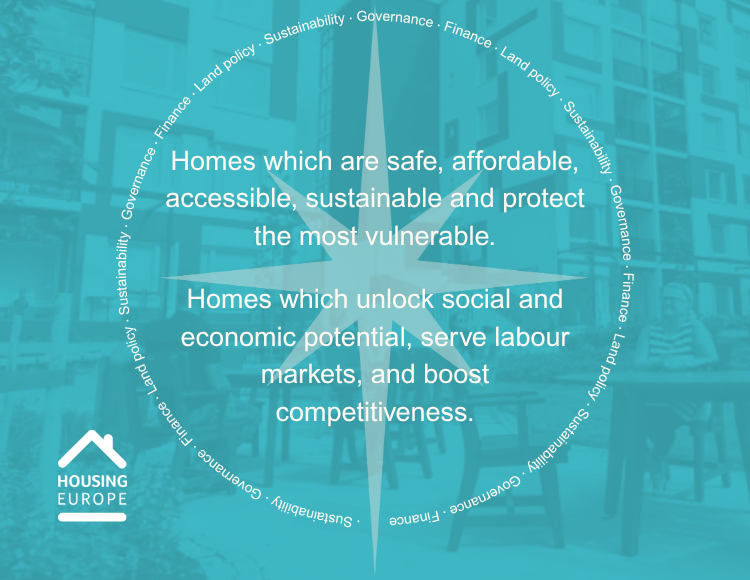Thursday 05 June 2025 9:30-12:30
Watch the welcome from Anaclaudia Rossbach,Executive Director, UN Habitat
International Social Housing Festival, the Convention Centre Dublin (Liffey Hall 1)
In an era where housing has become one of the most pressing political issues, there is a growing momentum behind Europe’s efforts to tackle the crisis. While views may remain divided, this moment presents a unique opportunity to return to the core principles of effective housing systems. What are the key ingredients for a housing system that works? What will it take to deliver homes which boost social capital and competitiveness?
Introducing the European Housing Compass
The European Housing compass is a tool to help navigate the complex housing landscape. Its north star is well functioning housing systems which serve communities and unlock their potential.
The north star: well-functioning housing systems
Well-functioning housing system do not necessarily look alike. The long histories of each country and region have shaped individual systems which have their own strengths and weaknesses. A rule or tool that works in one region may not work in another.
Given this diversity, as the European Union accelerates its work on housing, it must first be clear in defining an ambition which can apply across the bloc – a shared, achievable goal which leaves a space for each level of governance to do what they do best, in their own context.
The EU housing crisis in 2025
With average rents increasing by 19% and house prices by 47% in the EU between 2010 and 2022, with 10% of Europe unable to keep their homes warm, and with building permits at a nine- year low, the housing crisis is a clear and present danger to social stability and our economy. According to Eurofound ‘Private rental market tenants are in a particularly precarious situation; 46% feel at risk of needing to leave their accommodation in the next three months because they can no longer afford it’[1]
There are good reasons to act: investing in affordable housing has been shown to reduce the risk of poverty by 40%. High housing costs reduce the purchasing power of households, giving them less access to essential goods and services, and lowering consumption. Another study showed the total cost of inadequate housing to the EU economy was nearly €194 billion; the investment required to solve this issue would be repaid within 18 months by projected savings such as lower healthcare costs and better social outcomes[2].
The role of public, co-operative, and social housing
The private housing market cannot adequately meet everyone’s needs. With a large portion of new housing supply purchased by investors or speculators, the supply does not match demand; the needs of high earners are prioritised, homes are left vacant and prices rise. Affordable housing must be affordable in the long term; this has proved difficult with private developments which often only guarantee affordability in the short term. The private market also does not respond effectively to the specific needs of urban and rural areas
One of the key tools identified to address these market failures and support people in accessing their right to decent and affordable housing is dedicated social and affordable housing providers.
Dedicated social and affordable housing providers are also essential to meet policy goals such as combatting homelessness and poverty, supporting social mobility, implementing social mix, contributing to sustainable urban development, and tackling climate change. By offering long-term access to affordable housing of decent quality, they facilitate household formation, educational attainment and personal development, individual health, as well as economic and social participation. In targeting low- and moderate- income households, and key workers, they boost labour markets, competitiveness, and productivity.
[1] Eurofound (2023), Unaffordable and inadequate housing in Europe, Publications Office of the European Union,
Luxembourg.
[2] Eurofound (2016), Inadequate housing in Europe: Costs and consequences, Publications Office of the
European Union, Luxembourg.
Agenda
Introduction
9:30-9:45 Introducing the compass
Bent Madsen, President, Housing Europe
9:45-10:00 Prof. Dr. Michelle Norris, Director of the Geary Institute and Full Professor of Social Policy, University College Dublin
10:00-10:15 The European Commission’s approach to tackling the housing crisis. Matthew Baldwin, Head of Housing Task Force, European Commission
10:15 – 10:20 Video Anaclaudia Rossbach, Executive Director, UN Habitat
The challenges
10:20 – 11:00 Addressing Demographic changes
- Noémi Huszka, Service Development Expert at MR KÖZÖSSÉGI LAKÁSALAP KÖZHASZNÚ NONPROFIT KFT (Hungary)
- Brian Micallef, Executive Head of Digitalisation, Legal and Communications at Malta Housing Authority
- Robin van Leijen, Senior European Public Affairs at AEDES (The Dutch Association of Housing Corporations)
- Sofia Hansdotter, Expert Property Development & New Construction, Property & Sustainability at Public Housing Sweden
11:00– 11:30 Climate-resilient housing
- Geert De Pauw, Project Leader at Community Land Trust Brussels (CLTB) (Belgium)
- Jouni Parkkonen, CEO at Kova Finland
- Paul Sarais, Head of the financing, strategies and innovation division at Union Social pour l’Habitat (France)
11:30 – 11:50 Homelessness
- Helena Vaz, CEO at MatosinhosHabit (Portugal)
- Gerlinde Gutheil-Knopp-Kirchwald, Department of Housing Economics and Research at GBV (The Austrian Federation of Limited-Profit Housing Associations)
Debate
11:50-12:20 Next steps for the compass
- Sorcha Edwards, Secretary General, Housing Europe
- Prof.dr.ir. Marje Elsinga, professor of Housing Institutions & Governance, TU Delft
- Andrea Colantonio, Lead Economist at the European Investment Bank (EIB), European Investment Bank
- Matthew Baldwin, Head of Housing Task Force, European Commission
Closing
12:20 Bent Madsen, President, Housing Europe
